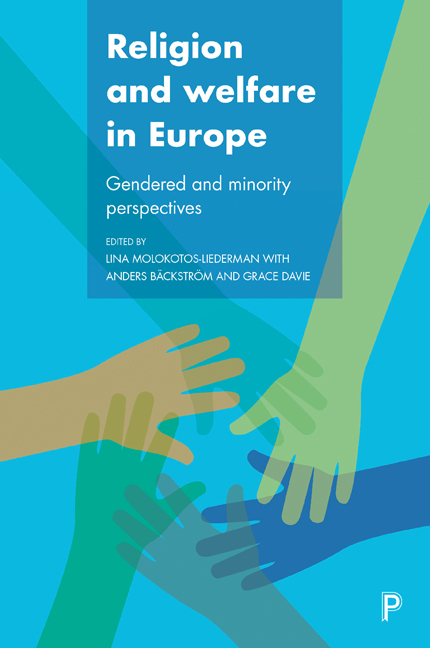Book contents
- Frontmatter
- Contents
- List of tables, figures and maps
- Acknowledgements
- Notes on contributors
- one Introduction
- Part One Thinking methodologically: approaches to research and practice
- Part Two Thinking regionally: key case studies in welfare and religion in Europe
- Part Three Gendered and minority perspectives
- Part Four Drawing the threads together
- Appendix: the WaVE team
- Index
Eleven - The moral and gendered crisis of the Italian welfare system seen through the prism of migrant women’s reproductive health
Published online by Cambridge University Press: 05 April 2022
- Frontmatter
- Contents
- List of tables, figures and maps
- Acknowledgements
- Notes on contributors
- one Introduction
- Part One Thinking methodologically: approaches to research and practice
- Part Two Thinking regionally: key case studies in welfare and religion in Europe
- Part Three Gendered and minority perspectives
- Part Four Drawing the threads together
- Appendix: the WaVE team
- Index
Summary
The first part of this chapter reflects on the Padua case study of the Welfare and Values in Europe: Transition Related to Religion, Minorities and Gender (WaVE) project, which focused on reproductive health and on access to local welfare for migrant women (Frisina and Cancellieri, 2012). Using participant observation and in-depth interviews, we compared the discourses and practices of migrants and welfare workers, and identified three sets of values: universalism versus differentialism/particularism; gender equality versus traditional gender roles; and secularism versus religious values in the field of reproductive health. The research reveals the failures of universalism, the conservative nature of the Italian welfare system in practice, and the difficulties of secularism in the field of reproductive health.
The second part of the chapter revisits the video that was produced in order to communicate the WaVE research results to a wider audience. We worked together with intercultural mediators and welfare workers to organise focus group discussions with migrant women from Nigeria and Romania. As the title of the video suggests (As Human Beings and Citizens), it is a ‘double’ invitation from migrant women, who are asking welfare workers to treat them fairly (‘as human beings’), but who are also calling on other women in similar social conditions to act as people with rights (‘as citizens’). They refuse to be viewed (by the dominant and disempowering charity framework) as above all needy and destitute people.
The third part of the chapter focuses on how the worsening welfare crisis in Italy has had negative effects on the social rights of women, above all migrants. I argue that this crisis is not simply due to the 2008 global financial crisis and ensuing recession, but to a moral crisis of the European social model that reinforces the traditional conservatism of the Italian welfare system. The moral crisis of the Italian welfare system is a gendered crisis, because growing health inequalities concern primarily migrant women. In response, the new public activism of the Catholic Church contributes to tensions relating to the values of the Italian welfare system and society. In this context, forging connections between migrant and Italian women seems even more difficult because of the rise of racism and Islamophobia.
- Type
- Chapter
- Information
- Religion and Welfare in EuropeGendered and Minority Perspectives, pp. 235 - 258Publisher: Bristol University PressPrint publication year: 2017



